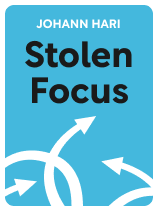

This article is an excerpt from the Shortform book guide to "Stolen Focus" by Johann Hari. Shortform has the world's best summaries and analyses of books you should be reading.
Like this article? Sign up for a free trial here .
What are some tips to stay focused? Do you want to help others stay focused too?
In Stolen Focus, Johann Hari suggests that we have a societal attention crisis: We’re all losing our ability to concentrate. His proposed solution for the attention crisis has two parts: systemic changes and a citizen-led movement.
Check out how everyone can benefit from these tips to stay focused.
1. Systemic Changes
The first of two tips to stay focused is to make systemic changes. According to Hari, our model of constant economic growth drives most of the factors contributing to the attention crisis. “Success” under the economic growth model requires companies to get larger and individuals to get richer. To grow, businesses continuously find ways to sell more products, which traps consumers in a pattern of doing more and buying more each year. Hari contends that the stress of a growth-oriented society undermines our ability to focus, and because it’s a societal problem, it requires societal solutions.
He argues that we could shift from constant growth to a steady-state economy. In this new model, we would define success by different values, such as having job security and enough time to pursue goals outside of work. This would require changing how society functions today, including the tech business model, and work and school schedules.
Hari advocates three systemic changes to carry out this tip to stay focused:
1) Fewer work hours. Some companies have established four-day work weeks or reduced daily hours without compromising productivity. This has given workers more time to rest and participate in activities that are meaningful to them, helping them feel less stressed and more engaged with their work. However, Hari warns that this change only benefits salaried workers.
2) More opportunities for children to play. Stress and anxiety can lead to children developing attention problems, and one way for them to learn to manage negative emotions is by allowing them more time to play. Hari believes schools should offer more opportunities for students to play and pursue their own interests, and focus less on standardized testing. Outside of school, adults should give children time to play, be curious, and be outdoors instead of in front of screens.
3) Different technology under different incentives. Some changes could make technology less disruptive. Hari proposes removing features that intentionally interfere with your attention, such as incessant notifications, and adding features to bring you back to reality, such as slowing down the download speed after you’ve spent a certain amount of time on a website. (Shortform note: The technology Hari is advocating echoes the philosophy of digital minimalism, which asks that digital tools promote your priorities and minimize their harm.)
However, Hari argues that there are no incentives for technology companies to make their products less disruptive. The only way for those incentives to shift is by banning surveillance capitalism or making it illegal to compile people’s data and use it to target their vulnerabilities. This would reform the business model that most tech companies rely on.
2. Attention Rebellion
The second tip to stay focused is raising awareness about the attention crisis. Hari argues that the attention crisis warrants an “attention rebellion” to galvanize millions of people to pressure governments and businesses to make changes. He believes that sparking this movement requires the following steps:
1) A symbolic moment that raises awareness. At an initial stage, a group of core activists who are well-informed on the attention crisis must stage a symbolic battle against the forces stealing our focus. For example, they might hack social media networks for a day to show people that it’s possible to live without these apps. That symbolic battle would help more people understand the gravity of the situation.
2) A wider movement involving political and social actors. As more people become engaged in the issue, it will be necessary to involve some of them in the political arena so they can influence decision-makers, while others continue to energize normal citizens to become involved and exert pressure on governments and companies.

———End of Preview———
Like what you just read? Read the rest of the world's best book summary and analysis of Johann Hari's "Stolen Focus" at Shortform .
Here's what you'll find in our full Stolen Focus summary :
- The seven factors causing the current attention crisis
- Johann Hari's three-part solution to gaining your attention back
- Why society needs to change, not just individuals






